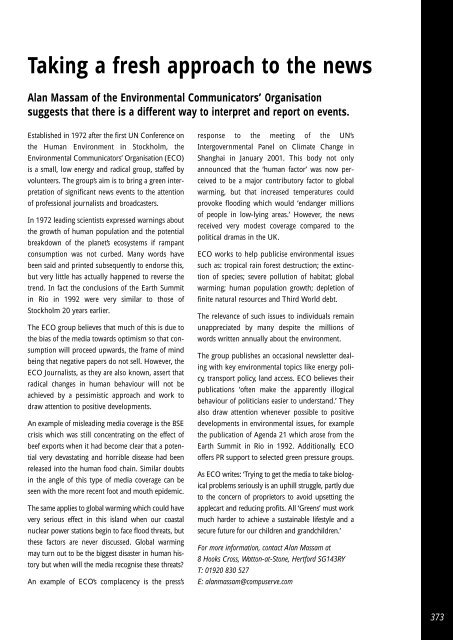new sustainability projects in the District.Forest of Dean District CouncilHigh Street, Coleford, Gloucester GL16 8HGT: 01594 810 000E: council@fdean.gov.ukW: www.fdean.gov.ukThe Forest of Dean District Council providesthe usual range of services that would beexpected from a District Council, and manythat directly affect local quality of life. TheHousing and Environmental ServicesDirectorate includes waste collection and theprovision of recycling facilities. The housingdepartment manages social housing,including energy efficiency and therequirements of the Home EnergyConservation Act. A Technical Services teamensures that energy use is reduced year onyear as far as possible within CouncilOffices. The Environmental Services Sectionundertakes air quality monitoring and issueslicenses for some industrial processes. It isalso compiling a Contaminated LandRegister for the District and enforces the lawrelating to noise. This part of theDepartment undertakes inspections of foodpremises and health promotion initiatives.The Planning Department has recentlyundertaken a review of the Local Plan whichallocates land for various different types ofdevelopment. It also administers Planningapplications. Within the department is asmall team dealing with countrysidemanagement, including nature conservationand access to the countryside by variousmodes, such as pedestrian and cycling.Leisure and tourism are both importantelements of this department, with fiveleisure centres under part or total DistrictCouncil management, and tourismconstituting a growing sector of the localeconomy.Gloucestershire County CouncilEnvironment Department, Shire Hall, WestgateStreet, Gloucester, Gloucestershire GL1 2TGT: 01452 425 677E: sustainability@gloucestershire.gov.ukW: www.gloucestershire.gov.ukVisit the Council’s web site to find out moreabout its approach to sustainabledevelopment and to finds links tobusinesses, services and organisations.Mid Devon District CouncilThe Great House, 1 Saint Peter’s Street, Tiverton,Devon EX16 6NYT: 01884 234 387W: www.middevon.gov.ukO: Mon-Fri 9.30am-5pmThe council has its own environmentalpolicy and is producing a green purchasingguide for community development. TheLA21 plan is currently being updated so callfor further information on transport issues,recycling and waste management, pollutioncontrol and housing.North Somerset CouncilPO Box 146, Town Hall, Weston-Super-Mare,Somerset BS23 1LHT: 01934 884 472W: sustainability@n-somerset.gov.ukW: www.northsomerset.gov.ukO: Mon-Fri 9am-5pmSupports the development of sustainablecommunities by taking action withbusinesses, organisations, agencies andindividuals to achieve positive change in thelocal area. Projects that it is currentlyinvolved in include: quality of lifeindicators, local and sub-regional food work(including co-ordinating the local farmer’smarkets), sustainable construction andsupporting the local fair trade andenvironment networks. Also aims tointegrate sustainability into all aspects of thework carried out by the Council and theNorth Somerset Partnership.Plymouth City CouncilThe Department of Environment, Civic Offices,Plymouth, Devon PL1 2EWT: 01752 668 000W: www.plymouth.gov.ukO: Mon-Fri 9am-5pmThe Plymouth LA 21 Agenda Team arecurrently working on a wide range ofinitiatives and projects to make Plymouth amore sustainanble place. They are workingon areas such as transport, recylcing, wastemanagement and educational programmesfor schools. Call for more information.Portsmouth City CouncilDirectorate of Environment & Transport’, CivicCentre, Guild Hall Square, Portsmouth PO1 2AZT: 02392 834 247E: cityhelpdesk@portsmouthcc.gov.ukW: www.portsmouthcc.gov.ukCall for more information.Poole Agenda 21 Forum8 Wood Lane, Bearwood, Bournemouth, DorsetBH11 9NGT: 01202 574 720Environmental campaigns groupSouth Gloucestershire CouncilCouncil Offices, Castle Street, Thornbury,Gloucestershire BS35 1HFT: 01454 863 872E: lisa.eve@southglos.gov.uk;jane.thompson@southglos.gov.ukW: www.southglos.gov.ukO: Mon-Fri 9am-5pmSouth Gloucestershire is a Unitary Authoritywhich has recently completed itsCommunity Strategy, which incorporates allaims and targets previously encapsulated inits LA21 Strategy. The Community Strategyhas seven themes: Where we live; Economyand work; Environment; Getting around;Health and care; Learning and skills; andSafe communities. The Community Strategywas developed by the Local StrategicPartnership, which also has a role inmonitoring progress on implementation ofthe goals and targets through the annualCorporate Priorities. There is a Local Agenda21 Forum & Steering Group, which hasoverall responsibility for driving andmonitoring the Environment theme of theCommunity Strategy, but also works toensure sustainability concepts aremainstreamed through all other themes.Swindon Metropolitan BoroughCouncilDepartment of Planning, Environment &Transport, Civic Offices, Swindon SN1 2JHT: 01793 526 161Call for more information.Wiltshire County CouncilCounty Hall, Trowbridge BA14 8JNT: 01225 713 000Call for more information.Advice & OrganisationsImprovement and DevelopmentAgency (IDeA)Layden House, 76-86 Turnmill Street,London EC1M 5LGT: 020 7296 6600; 7296 6420E: knowledge@idea.gov.ukW: www.idea.gov.ukOne of the key requirements of the LocalSustainability Team (Lst) within the IDeA isto facilitate the mainstreaming ofsustainability within local government bycollecting and joining up information fromthe field. There is a pool of information inthe key themes within the field ofsustainability both from the internal LocalLiving Programme (LLP) and through linksto external work. The LLP looks at whatmakes a sustainable community using theheadline themes of the built environment,the natural environment, regeneration, crimeand safety, health, transport, education forsustainable development and recreation andtourism. There is information on crossassociated themes including climate changeand energy, waste and governance. Twothemes in have been launched initiallywhich cover education for sustainabledevelopment and regeneration. Subsequentthemes will be added on a regular basis, thebuilt environment and climate change andenergy will follow shortly.Institute of Local Government StudiesThe School of Public Policy, University ofBirmingham, Edgbaston, Birmingham B15 2TTT: 0121 414 5008E: C.E.Rance@bham.ac.ukW: www.inlogov.bham.ac.ukOffers research and consultancy on mattersconnected with local government, not leastin connection with the environment. Holdsseminars on how local governmentcouncillors and officers can best promotesustainability and waste management. Worksmainly with councils, governmentdepartments and agencies.National Association of LocalCouncils109 Great Russell Street, London WC1B 3LD346
Taking a fresh approach to the newsAlan Massam of the Environmental Communicators’ Organisationsuggests that there is a different way to interpret and report on events.Established in 1972 after the first UN Conference onthe Human Environment in Stockholm, theEnvironmental Communicators’ Organisation (ECO)is a small, low energy and radical group, staffed byvolunteers. The group’s aim is to bring a green interpretationof significant news events to the attentionof professional journalists and broadcasters.In 1972 leading scientists expressed warnings aboutthe growth of human population and the potentialbreakdown of the planet’s ecosystems if rampantconsumption was not curbed. Many words havebeen said and printed subsequently to endorse this,but very little has actually happened to reverse thetrend. In fact the conclusions of the Earth Summitin Rio in 1992 were very similar to those ofStockholm 20 years earlier.The ECO group believes that much of this is due tothe bias of the media towards optimism so that consumptionwill proceed upwards, the frame of mindbeing that negative papers do not sell. However, theECO Journalists, as they are also known, assert thatradical changes in human behaviour will not beachieved by a pessimistic approach and work todraw attention to positive developments.An example of misleading media coverage is the BSEcrisis which was still concentrating on the effect ofbeef exports when it had become clear that a potentialvery devastating and horrible disease had beenreleased into the human food chain. Similar doubtsin the angle of this type of media coverage can beseen with the more recent foot and mouth epidemic.The same applies to global warming which could havevery serious effect in this island when our coastalnuclear power stations begin to face flood threats, butthese factors are never discussed. Global warmingmay turn out to be the biggest disaster in human historybut when will the media recognise these threats?An example of ECO’s complacency is the press’sresponse to the meeting of the UN’sIntergovernmental Panel on Climate Change inShanghai in January 2001. This body not onlyannounced that the ‘human factor’ was now perceivedto be a major contributory factor to globalwarming, but that increased temperatures couldprovoke flooding which would ‘endanger millionsof people in low-lying areas.’ However, the newsreceived very modest coverage compared to thepolitical dramas in the UK.ECO works to help publicise environmental issuessuch as: tropical rain forest destruction; the extinctionof species; severe pollution of habitat; globalwarming; human population growth; depletion offinite natural resources and Third World debt.The relevance of such issues to individuals remainunappreciated by many despite the millions ofwords written annually about the environment.The group publishes an occasional newsletter dealingwith key environmental topics like energy policy,transport policy, land access. ECO believes theirpublications ‘often make the apparently illogicalbehaviour of politicians easier to understand.’ Theyalso draw attention whenever possible to positivedevelopments in environmental issues, for examplethe publication of Agenda 21 which arose from theEarth Summit in Rio in 1992. Additionally, ECOoffers PR support to selected green pressure groups.As ECO writes: ‘Trying to get the media to take biologicalproblems seriously is an uphill struggle, partly dueto the concern of proprietors to avoid upsetting theapplecart and reducing profits. All ‘Greens’ must workmuch harder to achieve a sustainable lifestyle and asecure future for our children and grandchildren.’For more information, contact Alan Massam at8 Hooks Cross, Watton-at-Stone, Hertford SG143RYT: 01920 830 527E: alanmassam@compuserve.com373



